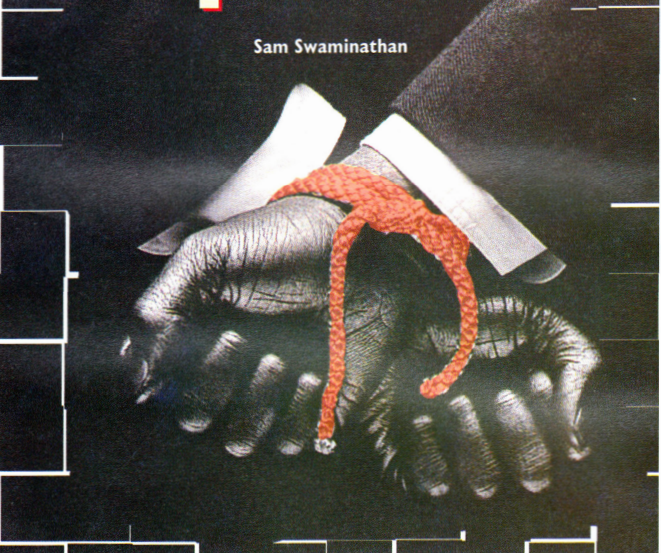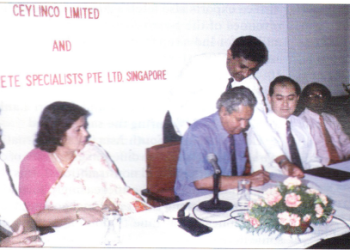Sam Swaminathan

Here’s a little quiz to tease the mind why is it that we depend so much upon our past experiences? One answer is that there simply isn’t anything else to depend upon. Now this can be a good thing and a bad thing. After all, I have been brushing my teeth for as long as I can remember using a plain old brush. It served me well all these years, and here is my dentist asking me to change such a fundamental tool.
What I didn’t realize was the fact that the use of the ordinary toothbrush was perhaps one of the reasons why I was being asked to use an electric toothbrush. I resist the fact that my teeth require a different type of care at this age. I am tempted to say, ‘look here, I have always used an ordinary toothbrush, so why should I be changing it now?’ The fact is, my teeth have changed over time, and technology allows me to use something different for better results.
You are faced with a similar challenge with your customer. The point is that if you don’t meet the customer’s expectations, he will simply vote with his feet by walking across to the competitor. The competitor, by the way, is waiting for just this kind of opportunity. Fail to serve your customer to his satisfaction, and you will lose his custom.
Unfortunately, it isn’t easy to replace old habits. Things will get even more difficult if those old habits had given you a measure of success. You are up against a wall of resistance. The old, familiar and comfortable routines beckon you to remain where you are, and continue doing what you have always done.
The past suddenly becomes a block to progress. The very same set of experiences which helped you climb the heady ladder of success now works twice as hard to deny you success in the future. You are unable to forget the old ways. This is what I mean by ‘Learning to Forget.”
For sure, experience is a great teacher. There isn’t a better one. But this very thing called experience comes in the way of new learning. Here’s a little story about resistance to new learning. At one of my workshops, I showed the participants the layout of the ‘DVORAK simplified keyboard, and asked them what they thought of it. I explained that this keyboard was far more efficient than the traditional ‘QWERTY keyboard, and there was enough evidence to support this claim. Would they like to change over to this keyboard?
The majority of the participants were not keen to change over. After all, the universal ‘QWERTY keyboard has served us humans so well for over a hundred years. We then listed out the reasons why the participants didn’t support the switch. Next on, these reasons were classified as emotional and rational. Not surprisingly, the emotional reasons out- numbered the rational.
Test results showed that the DVORAK keyboard increased typing speed by more than 40%. Yet, the DVORAK keyboard has not found favor. So, why were the participants not thrilled to consider the change? One overpowering reason was that they would have to unlearn their current typing skill, before the new learning can take place. And herein lies the meat of the matter.
There is great discomfort in unlearning. This means learning to forget a learning that has become second nature over the years.
The tendency to depend upon one’s experience can be traced back to the way the human mind (and indeed other minds) works. The human mind is a patterning system. In other words, the mind collects experiences and stores them in patterns. Whether I have to open a bottle of ketchup or simply brush my teeth, I fall back upon past experiences to successfully handle the task.
So, the patterning system of the mind enables us to perform routine tasks with great ease. Remember how we drive to work. We get into the car, and perform a variety of complex tasks like turning on the ignition, clicking the seat belt, engaging the gears and so on. Without the slightest conscious effort, we drive off to work. All this while the mind is merrily whirring away, engaged in matters totally unconnected with traveling to work. This wouldn’t happen with- out cooperation from the marvelous patterning system of the mind.
The simple handling of the complex task of driving to work is based upon experience. Neat stuff this patterning system. Without it, we couldn’t even begin to accomplish the trillions of ordinary and mundane routines we perform each living day, with such ease and comfort. But wait, there is a dark side to this matter as well. Unfortunately, the patterning system, the very mechanism that gave us the power to master routine tasks resists relearning. and the assimilation of new concepts.
The way in which we gather experience about work and all other things is no different. We face a problem one day at work. The mind immediately dives into its cavernous storage and looks for a precedent. If it strikes a match or a near match, you got yourself a solution. You pat your back about your rich experience. After all, it will stand in good stead time and. time again.
But wait a minute, the last time you solved this problem, maybe just maybe the circumstances were different. Often enough, in these fast changing times, the circumstances are vastly different now. Consider this scenario. You are a salesperson who has been dealing with a particular customer for fifteen years. Your contact point is the chief buyer at the client’s office. Traditionally, the buyer has been buying your products or services on a once-a-month basis. This worked well all these years.
The last time you visited him, he told you that his company has decided to go in for just-in-time inventory. The company has been facing stiff competition from innovative players in the market. Customers are beginning to look at their own inventory carrying costs, and want to reduce them. This has become a barebones necessity for survival in the business environment.
So your customer is looking to you for some ideas. Now, you are in a dilemma. You have been doing things in a particular manner for fifteen years, and your customer wants you to shaft those methods. This reminds me of the first time my dentist asked me to use an electric tooth brush. I resisted the suggestion. The bad habit of ‘Forgetting to Learn.”
You find yourself in exactly the same situation with your customer we talked about earlier. If you don’t learn what Just-in-time inventory is all about, and your company doesn’t do something about providing this benefit to your customer, you are in deep trouble. You have to learn to forget the traditional method in order to absorb the new method. Moral of the story -embrace new habits in order to get rid of old habits. These old habits have a nasty way of coming back.
Here’s another learning that organizations find very hard to embrace. Learning from their front-line staff and consultants. Front-line staff are considered good employees as long as they nod their heads in agreement to what their managers say. In the same way, consultants are considered good as long as they praise their clients. Tell them something that isn’t all that good in a polite manner, and you will be ignored. Say it again with emotion, and watch the boss/client react. You are in considerable trouble! Who knows, you might even lose the business! That much for being willing to take criticism. For heaven’s sake, don’t we ever see ourselves in the mirror?
But then that’s life. If it had been anything different the DVORAK keyboard would have become a smashing success in no time. The indisputable reality though is that corporations that are willing to learn new tricks will leap ahead, leaving the rest behind. Is your company overburdened by the tyranny of experience? Where do you think your organization lies in this continuum?
Sam Swaminathan is a Soft Skills Management expert, trainer, speaker, and consultant. Sam Swaminathan is also the founding director of theCentre for Creative Thinking, Dubai.




